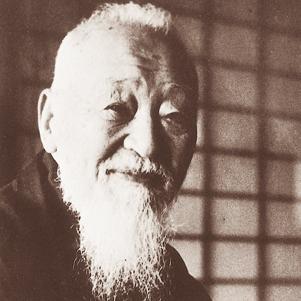The tea master and ambitious industrialist who cautioned against being tempted by short term gains

Takashi Masuda
1848-1938
Takashi Masuda established a new form of business—the general trading company—and became Mitsui & Co.’s first president at the tender age of 29. Masuda is also renowned as the person who founded the Chugai Bukka Shimpo, the predecessor of the modern-day Nihon Keizai Shimbun. He became a master of tea ceremony and, in his latter years, took the name Donno, becoming known as the greatest influence on tea since Sen no Rikyu. Takashi Masuda truly was a man of great stature. He was also a student at the Hepburn Academy.
The young man who kept his sights set overseas
Takashi Masuda was born in 1848, in the final years of the shogunate. His birth came five years before Commodore Perry’s Black Ships entered port at Uraga. His birthplace was Sado Island and he was originally named Tokunoshin. He lived on Sado Island until the age of eight by the traditional system of age reckoning (whereby newborns are considered one year old at birth and a year is added to everyone’s age on New Year’s Day). In 1855, his father Takanosuke, a shogunate official, was transferred to Hakodate to open a shogunal office and his family moved there with him.
Four years after that, Takanosuke was appointed to a post working for the office of the commissioners of foreign affairs and moved to Edo with his family. The office of the commissioners of foreign affairs was the equivalent of today’s Ministry of Foreign Affairs. Tokunoshin became a foreign language training apprentice.
He spent time on Sado Island and in Hakodate and Edo. This meant that both father and son were working in the places that had the closest contact with other countries of anywhere in Japan at the time. This was probably a key factor that influenced the character of the man later known as Takashi Masuda.
The young man’s eyes were always fixed firmly overseas.
Handling 20% of Japan’s foreign trade
In 1862, Tokunoshin passed the foreign language examination and became an interpreter for the shogunate at the age of 14. Just 14 years old! He was then ordered to work at the U.S. Consulate at Zenpukuji Temple in Azabu, where he encountered America’s first envoy to Japan, Townsend Harris. The following year, he had the opportunity to come into close contact with modern European civilization when he visited Europe as an attendant to Nagaoki Ikeda when Ikeda led the Second Japanese Embassy to Europe.
It was around that time that Tokunoshin began to attend school, aiming to further his study of the English language. That school was the Hepburn Academy, the forerunner to Meiji Gakuin, which had opened in 1863.
After the Meiji Restoration, Masuda worked for a trading house in Yokohama and then, after getting to know Kaoru Inoue, joined the Ministry of Finance at his request. However, Inoue resigned soon after and established a trading company, Senshu Gaisha, to which he appointed Masuda as vice president. Five years later, in 1876, Senshu Gaisha became Mitsui & Co. and Masuda was appointed as its first president. He was still just 29 years old.
It was also around this time that he founded the Chugai Bukka Shimpo newspaper, the predecessor of the Nihon Keizai Shimbun. His purpose in doing so was to inform merchants in inland areas of Japan of fluctuations in prices at home and abroad. This newspaper went on to be renamed the Chugai Shogyo Nippo and then, after the war, became the Nihon Keizai Shimbun, achieving a rapid increase in circulation.
In 1888, Masuda succeeded in acquiring the Miike coal mine when it was sold off by the Ministry of Industry’s Department of Mines and established the Miike Coal Mine Company. This company, which later changed its name to Mitsui Mining Company, shipped the coal it produced to cities such as Shanghai, Hong Kong, and Singapore, becoming the driving force behind Mitsui & Co.’s dramatic growth.
Mitsui & Co. handled 300 types of product, including coal, rice, raw cotton, and raw silk, which were Japan’s major exports at the time. By the second decade of the 20th century, the company was said to handle about 20% of the total value of Japanese trade. This was the pinnacle of Takashi Masuda’s career as an industrialist.
The man who continually sought enduring prosperity
In the words of Takashi Masuda himself, "Let not short term gains tempt your mind, seek only enduring prosperity by embracing grand aspirations."
This perhaps sounds surprising, given that Takashi Masuda’s career might appear to have consisted entirely of the pursuit of short term gains. However, this was not actually the case. One thing that springs to mind is the fact that, as well as being a first-rate businessman, Masuda was also an accomplished practitioner of tea ceremony and an ardent collector of Japanese antiques. These were certainly not interests he took up to pass the time in his twilight years after becoming a successful industrialist, but rather activities that he had enjoyed even while playing an active role on the front lines of business.
